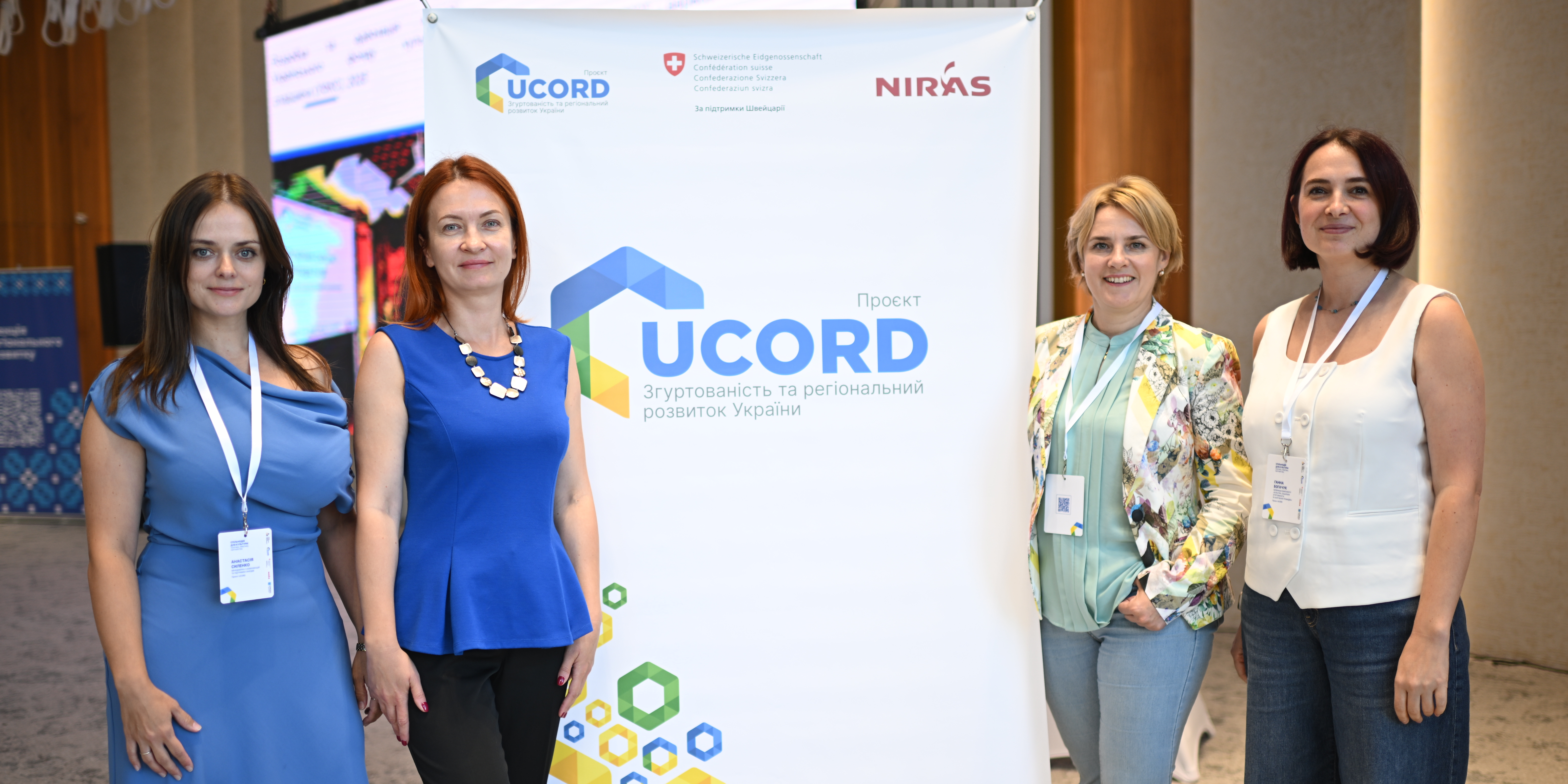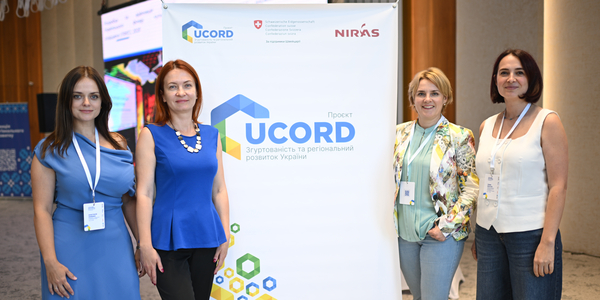Open dialogue and step-by-step implementation: What is needed for the success of institutional reform in cultural institutions
What new opportunities and changes will cultural community gain from the institutional reform of cultural institutions? Why is discussion of this reform so important for its acceptance and successful implementation?
These questions were addressed by participants at the two-day event, ‘Cooperation for Culture: Policy, Practice, Partnerships’, which brought together representatives from the cultural sector, the government, local authorities, the expert community and the Ministry of Culture and Strategic Communications of Ukraine in the Sumy region. The event was organised by the Sumy Regional Development Agency, the Sumy Regional Military Administration, and the PPV Economic Development Agency with the involvement of RES-POL project experts (Rapid Expert Support for Culture and Media Policies in Ukraine) as part of the Swiss-Ukrainian UCORD project (Cohesion and Regional Development of Ukraine).
The event focused on discussing cultural development and taking practical steps within the framework of Ukraine’s Cultural Development Strategy for 2025–2030.
‘The Swiss government places great importance on the strategic nature of its support for Ukraine, focusing on key areas of development in various sectors. We invited participants to this event to discuss the implementation of the Culture Development Strategy, particularly the reform of the cultural institution network, and to find ways to drive systemic qualitative change in the cultural and creative industries through practical dialogue,’ said Maryna Bryl, UCORD project manager.
During the welcome speeches, the event organisers emphasised the importance of culture, even during difficult times:
‘The myth that culture is irrelevant must be rejected. After all, culture shapes us. We continue to create what makes us Ukrainians,’ emphasised Oleksii Drozdenko, Deputy Head of the Sumy Regional State Administration – Head of the Regional State Administration for Digital Development, Digital Transformation, and Digitalisation.
The meeting was not just an expert discussion; it was also a platform for open dialogue. People were free to share their thoughts, ideas and even reservations, because it is through such conversations that solutions are born.
Hanna Bohachuk, Head of the Culture, Social Cohesion and Citizen Engagement Division of the UCORD project, emphasised that culture provides a space for safe dialogue on conflict-sensitive topics, as well as interaction within society. At the same time, it paves the way for the development of communities’ and regions’ economic potential. Strong, sustainable cultural institutions can combine these two aspects. This is why the reform of cultural institutions is so important.
Vision for institutional reform of cultural institutions
On the first day of the event, participants were inspired by the presentation of the publication ‘Cultural Profiles of Sumy Region Communities’, which was prepared by the Sumy Region Development Agency with the support of UCORD. They then discussed the opportunities and changes that could be gained by the cultural community from the implementation of institutional reform of cultural institutions.
According to Maryna Kulinich, Director of the Department of Strategic Planning and Investment Development at the Ministry of Culture and Strategic Communications of Ukraine, institutional reform of cultural institutions is an operational goal of the Culture Development Strategy until 2030:
‘This reform aims to change the system as a whole, and any systemic changes initially cause fear and resistance. Effective communication and step-by-step implementation are therefore key to success. First comes analytical research and the preparation of technical tasks for pilot projects. Then comes piloting in selected types of institutions and regions. Finally comes the formation of a systemic model of reform through a legislative framework and comprehensive changes in the field of culture. This reform is a complex but necessary process that will ensure the sustainability, innovation, and openness of cultural institutions,’ said Maryna Kulinich.
Volodymyr Vorobei, Director of the PPV Economic Development Agency, presented the vision of the RES-POL project for comprehensive reform of the cultural institutions network. This combines a liberal approach – particularly the opportunity for cultural institutions to develop and generate income – with responsible engagement on the part of these institutions. The reform focuses on three main components and key areas of development for the public cultural sector in Ukraine: reform of operational activities; reform of the financing system; and institutional reform.
‘Reform of cultural institutions is long overdue, as the current system prevents them from fulfilling their key role in driving development. Budget constraints, tariff scales and the inability to provide decent wages on the one hand, and the need to develop local identity and cultural practices within communities on the other, mean that cultural institutions are virtually unable to work effectively. Without their full activity, the development everyone expects is impossible,’ emphasised Volodymyr Vorobei.
Working groups: Challenges and opportunities
During the group work session, participants discussed the design of the reform, financing models and organisational and legal aspects. Key points included:
- without a strategic vision for culture, there will be no incentive to survive;
- a well-thought-out system design is needed for each area, as well as for developing cross-sectoral links. For example, links could be developed between education and culture;
- it is important to preserve clubs in small communities, as they often serve an important social function;
- challenges include local resistance, difficulty in attracting funding, a lack of management skills and the specific conditions of frontline territories;
- opportunities include international partnerships and cross-sectoral cooperation, as well as time to train specialists in step-by-step reform process.
The event wrapped up with a session on developing cultural project concepts. Each group presented a concept demonstrating the potential of local partnerships in preserving cultural identity and developing regions.
Reforming the network of cultural institutions is a long and difficult process requiring a step-by-step approach and constant communication. However, the organisers concluded that it is this reform that can provide communities with sustainable, modern cultural institutions that will drive development.
The event was organised by the Sumy Regional Development Agency in partnership with the Sumy Regional Military Administration and the PPV Economic Development Agency, with the involvement of experts from the RES-POL project (Rapid Expert Support for Culture and Media Policies in Ukraine) within the framework of the Swiss-Ukrainian project ‘Ukraine’s Cohesion and Regional Development’ (UCORD), implemented with the support of Switzerland via the Swiss Agency for Development and Cooperation by NIRAS Sweden AB.

25 February 2026
Новий погляд на впровадження політики полюсів...
Автори: Ярослав Жидик, керівник напрямку регіонального розвитку EasyBusiness, асоційований партнер консалтингової...
24 February 2026
Інклюзивний та людиноцентричний підхід у...
Людиноцентричний підхід та інклюзія — це вже не про додаткові заходи для окремих груп, а про проєктування систем...
24 February 2026
European LEADER approach for Ukrainian...
Ukraine launched the systematic implementation of the European LEADER approach, which is expected to revitalise rural...
24 February 2026
Анонс: вебінар «Робота з учнями та контингентом у системі АІКОМ-2: від зарахування до випуску»
Анонс: вебінар «Робота з учнями та контингентом...
Запрошуємо керівників органів управління освітою територіальних громад та представників органів місцевого...
